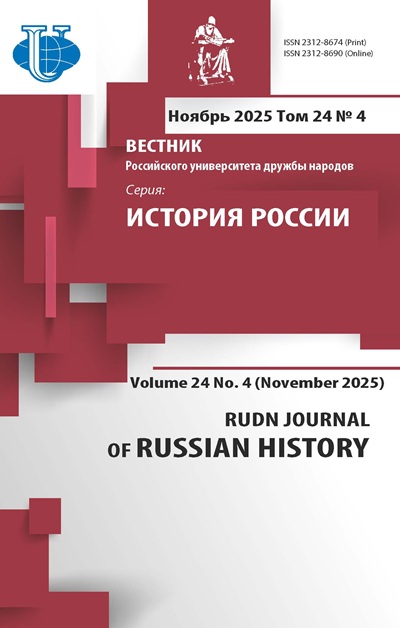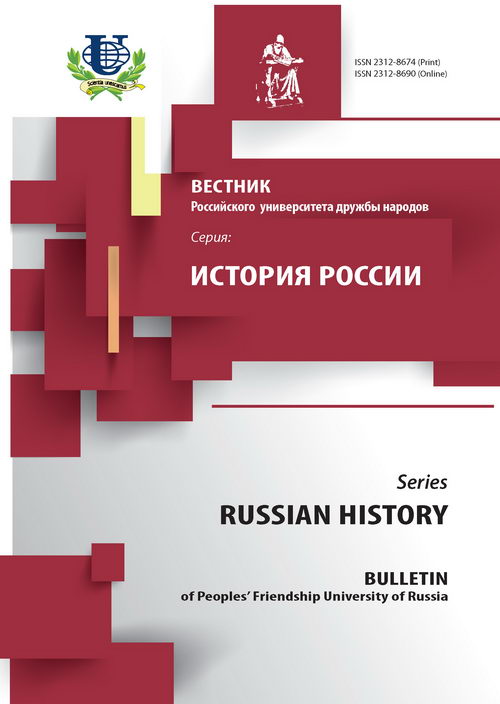«КЛАССОВЫЙ ПОДХОД» И «ПРОЛЕТАРСКИЙ ХАРАКТЕР» РЕВОЛЮЦИИ 1917 Г. В РОССИИ
- Авторы: Шульц Э.Э.1
-
Учреждения:
- Нижегородский государственный университет им. Н.И. Лобачевского
- Выпуск: № 3 (2014)
- Страницы: 47-61
- Раздел: СТАТЬИ
- URL: https://journals.rudn.ru/russian-history/article/view/4036
- ID: 4036
Цитировать
Полный текст
Аннотация
В статье рассматривается проблема «классового характера» Революции 1917 г. и правомочности термина «пролетарская революция». Автор анализирует вопросы участия различных социальных групп в Русской революции, проводит аналогии социального состава предшествующих революций, рассматривает принцип «классовости» революции как элемент идеологии в целях позиционирования партии большевиков и захвата власти.
Об авторах
Эдуард Эдуардович Шульц
Нижегородский государственный университет им. Н.И. Лобачевского
Email: nuap1@ya.ru
Кафедра международных отношений
Список литературы
- Ленин В.И. Неизвестные документы. 1891-1922 гг. - М., 2000. - С. 421, 428-429/
- Питерские рабочие и диктатура пролетариата. Октябрь 1917-1929. Экономические конфликты и политический протест. Сборник документов. - СПб., 2000. - С. 11, 13-14, 60-65, 113-115, 280-283.
- Гражданская война в России // Отечественная история. - 1993. - № 3. - С. 113.
- Амальрик А.С. К вопросу о численности и географическом размещении стачечников в Европейской России в 1905 г. // Исторические записки. - Т. 52. - М., 1955.
- Статистика стачек рабочих на фабриках и заводах за 1905 г. / Сост. В.Е. Варзар. - СПб., 1908.
- Статистика стачек рабочих на фабриках и заводах за трехлетие 1906-1908 гг. / Сост. В.Е. Варзар. - СПб., 1910.
- Рейман Н. Заметки по интерпретации 1917 года // Отечественная история. - 1994. - № 5. - С. 198.
- Статистический ежегодник России. 1913 г. Год десятый. - СПб., 1914. - С. 77, 87.
- Ленин В.И. Развитие капитализма в России // Ленин В.И. Полное собрание сочинений. Изд. 5-ое. Т. 3. - М., 1971. - С. 533.
- Ленин В.И. Что такое «друзья народа» и как они воюют против социал-демократов // Ленин В.И. ПСС. Изд. 5-ое. Т. 1. - М., 1967. - С. 326-327.
- Ленин В.И. Письмо А.М. Горькому, 14 августа 1907 г. // Ленин В.И. ПСС. Изд. 5-ое. Т. 47. - М., 1970. - С. 111.
- Ленин В.И. Петербургская стачка // Ленин В.И. ПСС. Изд. 5-ое. Т. 9. - М., 1967. - С. 175.
- Ленин В.И. Письмо П.И. Попову (О потреблении населения РСФСР до и после Октябрьской революции) // Ленин В.И. ПСС. Изд. 5-е. Т. 40. - М., 1974. - С. 342.
- Ленин В.И. Ценные признания Питирима Сорокина // Ленин В.И. ПСС, изд. 5-ое. Т. 37. - М., 1969. - C. 191-193.
- Степун Ф.А. Сочинения. - М., 2000. C. 615.
- Ленин В.И. Материалы к статье «Новые задачи и новые силы». Заметки к статье «Мобилизация армии пролетариата» // Ленин В.И. ПСС. Изд. 5-е. Т. 9. - М., 1967. - С. 403.
- Ленин В.И. Уроки революции // Ленин В.И. ПСС. Изд. 5-е. Т. 19. - М., 1968. - С. 421.
- Ленин В.И. Материалы к статье. С. 403.
- Ленин В.И. Уроки революции. С. 421.
- Ленин В.И. Удержат ли большевики государственную власть // Ленин В.И. ПСС. Изд. 5-е. Т. 43. - М., 1969. - С. 313.
- Ленин В.И. Письмо Г.Е. Зиновьеву, 30. IV. 1919 г. // Ленин В.И. ПСС. Изд. 5-ое. Т. 50. - М., 1970. - С. 296.
- Булдаков В.П. Красная смута. Природа и последствия революционного насилия. - М., 1997. С. 21.
- Грациози А. Великая крестьянская война в СССР. Большевики и крестьяне. 1917-1933. - М., 2001. - C. 10.
- Троцкий Л.Д. История русской революции. В 2 т. Т. 1: Февральская революция / Общ. ред. и вступ. ст. Н. Васецкого. - М., 1997. - C. 41, 64.
- Ленин В.И. Большевизм и «разложение» армии // Ленин В.И. ПСС. Изд. 5-е. Т. 32. - М., 1969. - С. 256.
- Ленин В.И. Заседание Центрального Комитета РСДРП(б) 16 (29) октября 1917 г. // Ленин В.И. ПСС. Изд. 5-е. Т. 43. - М., 1969. - С. 396.
- Знаменский О.Н. Всероссийское учредительное собрание. История созыва и политического крушения. - Л., 1976. - C. 270-271.
- Ленин В.И. Выборы в Учредительное собрание и диктатура пролетариата // Ленин В.И. ПСС. Изд. 5-ое. Т. 40. - М., 1974. - C. 1-24.
- Знаменский О.Н. Всероссийское учредительное собрание. C. 273, 275.
- Энгельс Ф. Быстрые успехи коммунизма в Германии // Маркс К., Энгельс Ф. Сочинения. Изд. 2-ое. Т. 2. - М., 1955. - С. 519.
- Тютюкин С.В., Шелохаев В.В. Марксисты и русская революция. - М., 1996. - C. 20.
- Нефедов С.А. Истоки 1905 года: «Революция извне»? // Вопросы истории. - 2008. - № 1. - С. 49.
- Воспоминания о Владимире Ильиче Ленине в 10 томах. Т. 3. - М., 1989. - C. 234-235.
- Ленин В.И. Конспект речи по вопросу об отношениях рабочих и интеллигентов в с.-д. организациях // Ленин В.И. ПСС. Изд. 5-е. Т. 10. - М., 1967. - С. 388.
- Первая революция в России: взгляд через столетие. - М., 2005. C. 540.
- Пятый съезд РСДРП. Май-июнь 1907 г. Изд. 2-е. - М., 1935. C. 660.
- Шестой съезд РСДРП (большевиков). Август 1917 г. Протоколы. - М., 1958. - C. 295.
- Восьмой съезд РКП(б). Март 1919 г. Протоколы. - М., 1959. - C. 452.
- Десятый съезд РКП(б). Март 1921 г. Протоколы. Стенографический отчет. - М., 1963. - C. 760.
- Дарендорф Р. Современный социальный конфликт. Очерк политики свободы - М., 2002. - C. 104.
- Шульц Э.Э. Социальная утопия как идеология социального протеста // European Social Science Journal. - 2013. - № 8-2 (35). - С. 496-507.
- Федотов Г.П. Судьба и грехи России. Т. 2. - СПб., 1992. - C. 93-94.
- Ленин В.И. В боевой комитет при Санкт-петербургском комитете // Ленин В.И. ПСС. Изд. 5-ое. Т. 11. - М., 1960. - С. 336-337.
- Ленин В.И. Советы постороннего // Ленин В.И. ПСС, изд. 5-ое. Т. 34. - М., 1969. - С. 383.
- Голдстоун Д. К теории революции четвертого поколения // Логос. - 2006. - 5 (56). - С. 82.
- Ленин В.И. Статистика и социология // Ленин В.И. Полное собрание сочинений. Изд. 5-ое. Т. 30. - М., 1973. - С. 356.
- Сорокин П.А. Социология революции // Сорокин П.А. Человек. Цивилизация. Общество. - М., 1992. - C. 287.
- Лефевр Ж. Аграрный вопрос в эпоху террора / пер. с фр. - Л., 1936. - C. 26, 131.
- Блок М. Характерные черты французской аграрной истории. - М., 1957. - C. 266.
- История Франции в трех томах / под ред. Манфреда А.З. - Т. 2. - М., 1973. - C. 38.
Дополнительные файлы















